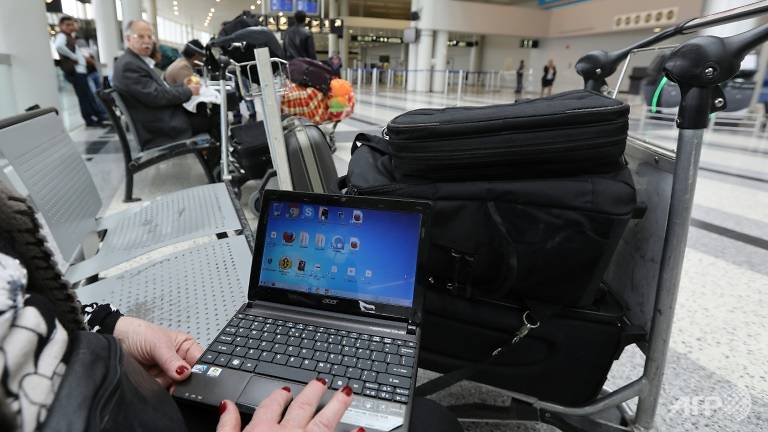EU, US hold 'robust' talks on possible airline latop ban
 |
| Top US and EU officials traded information on the serious evolving threats to aviation security and approaches to confronting such threats. (AFP/ANWAR AMRO) |
Both sides said they intended to hold more talks next week in Washington on a possible ban of such equipment.
"Both sides exchanged information on the serious evolving threats to aviation security and approaches to confronting such threats," a joint statement said.
They discussed "existing aviation security standards and detection capabilities" as well as security improvements "related to large electronic devices placed in checked baggage," it added.
The US Department of Homeland Security sparked deep concern in Europe last week when it said it would soon decide on extending to European airlines a carry-on computer ban on flights from eight mostly Muslim countries.
EU Home Affairs Commissioner Dimitris Avramopoulos and Transport Commissioner Violeta Bulc took part in what US officials said were four hours of "robust" talks with a US delegation led by Deputy Homeland Security Secretary Elaine Duke.
But a senior US administration official told reporters on a conference call that there were points of agreement and points they were continuing to discuss.
Homeland Security Secretary John Kelly was mulling "next steps" and would make any decision based on an evaluation of threats, the official said on condition of anonymity.
"Secretary Kelly has made no decision on expanding the restriction on large electronic devices in aircraft cabins, but the decision is currently under consideration," the senior official said.
A US ban on now ubiquitous laptops could cause havoc, with more than 3,250 flights a week scheduled to leave EU airports for the US this summer, according to industry data.
Some experts also say there is a security risk in putting them with checked luggage given the danger of their batteries catching fire.
In March, Washington banned passengers from eight countries in North Africa and the Middle East from bringing laptop computers, tablets and other electronic devices larger than cellphones as carry-on items.
Britain followed with a similar ban applying to incoming flights from six Middle East and North African countries.
The move, which requires passengers to put the devices into checked baggage, came amid concerns that jihadist groups were devising bombs disguised as batteries in consumer electronics items.
A bomb that blew a hole in the fuselage of a Somali airliner in February 2016, killing one person, is believed to have been built into a laptop computer carried into the passenger cabin.
What the stars mean:
★ Poor ★ ★ Promising ★★★ Good ★★★★ Very good ★★★★★ Exceptional
Latest News
More News
- Russian President congratulates Vietnamese Party leader during phone talks (January 25, 2026 | 09:58)
- Worldwide congratulations underscore confidence in Vietnam’s 14th Party Congress (January 23, 2026 | 09:02)
- Political parties, organisations, int’l friends send congratulations to 14th National Party Congress (January 22, 2026 | 09:33)
- 14th National Party Congress: Japanese media highlight Vietnam’s growth targets (January 21, 2026 | 09:46)
- 14th National Party Congress: Driving force for Vietnam to continue renewal, innovation, breakthroughs (January 21, 2026 | 09:42)
- Vietnam remains spiritual support for progressive forces: Colombian party leader (January 21, 2026 | 08:00)
- Int'l media provides large coverage of 14th National Party Congress's first working day (January 20, 2026 | 09:09)
- Vietnamese firms win top honours at ASEAN Digital Awards (January 16, 2026 | 16:45)
- ASEAN Digital Ministers' Meeting opens in Hanoi (January 15, 2026 | 15:33)
- ASEAN economies move up the global chip value chain (December 09, 2025 | 13:32)
















 Mobile Version
Mobile Version